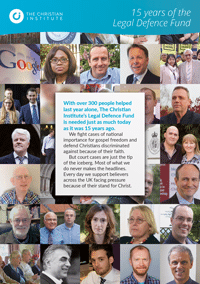Bideford Council
In 2012, the National Secular Society and a local atheist ex-councillor sued Bideford Town Council in Devon over its practice of praying at the start of council meetings – a practice understood to date back to the days of Queen Elizabeth the First.
They claimed that the prayers were discriminatory against atheist councillors, were a breach of human rights laws, and that the council had no lawful authority to hold prayers as part of its formal meetings.
Individual councillors were free to not take part in the prayers if they wished, and the register of attendance was not taken until after the prayers had finished.
The Christian Institute’s Legal Defence Fund supported the Council as it took the case to the High Court.
The High Court ruled that local councils have no lawful power to hold prayers during official business. But within days of the court’s decision, the Government fast-tracked the commencement of new laws that overtook the court’s ruling and restored councils’ right to hold prayers in England.
The Christian Institute’s Solicitor Advocate, Sam Webster, explains the wider significance of the case:
The National Secular Society won their claim for judicial review on a narrow, technical point, which related to whether councils have the legal power to hold prayers. As a result, the High Court declared prayers as part of formal council meetings to be unlawful.
However, this was a pyrrhic victory for the secularists. The UK government immediately fast-tracked new legislation which restored to councils in England the power to start their formal meetings with prayer.
In fact the High Court ruled against the National Secular Society in relation to their central argument that council prayers discriminated against atheists and breached their human rights. The court disagreed, establishing the principle that public bodies do not need to be secular in order to comply with equality and human rights law.Sam Webster, Solicitor Advocate, The Christian Institute



